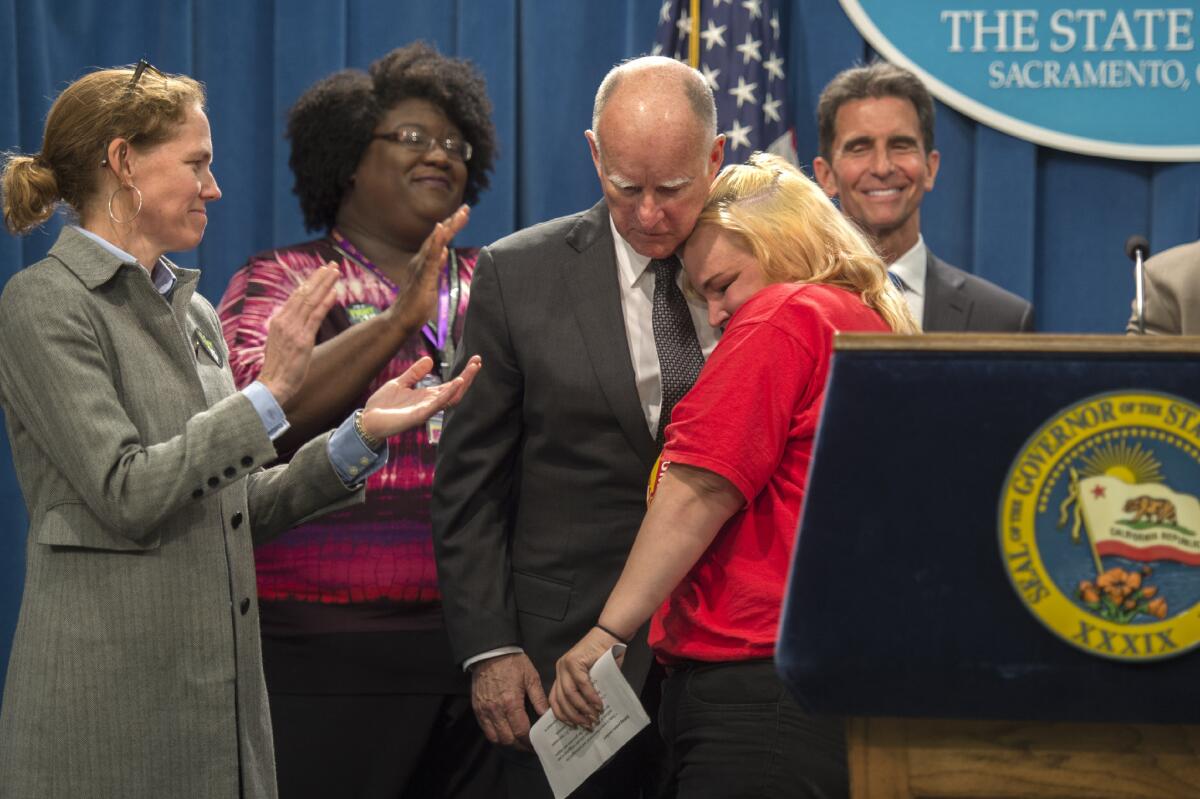Editorial: Brown’s minimum wage compromise is good, but it isn’t good enough

Gov. Jerry Brown hugs Burger King worker Holly Diaz, 38, of Sacramento, who has worked for the minimum wage for nine years.
In an attempt to head off two competing ballot measures, Gov. Jerry Brown secretly negotiated a compromise to raise the state minimum wage to $15 an hour by 2022, while allowing himself or the next governor to delay the incremental annual increase if the economy tanks. This is a better, more responsible proposal than either of the two initiatives, both of which would raise the wage to $15 more precipitously, and neither of which would allow for a pause during a recession. Brown announced the deal Monday, and Assembly and Senate leaders are now racing to approve the legislation.
But lawmakers should not be so quick to settle for a compromise that doesn’t address the very real concern that a wage hike of unprecedented size across very different regional economies could have serious and counterproductive consequences. While studies have shown that modest, gradual pay hikes don’t necessarily have significant negative effects on the number of jobs available, there’s little experience with wage increases on this scale — a 50% increase over six years or, if you take into account two recent increases, a 90% increase over nine years.
There’s even less experience or understanding of what will happen when such an enormous wage boost is imposed on communities with high unemployment, large, low-wage workforces and low costs of living. This page supported L.A.’s move to a $15 minimum wage, but what makes sense in Brentwood may not work for Barstow. Yet the current proposal ignores the dramatically dissimilar economic conditions in those communities, and the differing ability of businesses to manage higher labor costs or pass the costs on to consumers. Lawmakers are not doing their due diligence if they don’t take the time to analyze the alternatives to a blanket $15 minimum wage, or at least take steps to mitigate the potential impacts.
Brown ... [himself warned] earlier this year: “Raise the minimum wage too much and you put a lot of poor people out of work.”
It is critically important to help California’s low-wage workers, many of whom are single parents toiling at full-time jobs only to earn below-poverty wages. But Senate Pro Tem Kevin de Leon and Assembly Speaker Anthony Rendon are rushing to pass one of the most significant laws that will be considered this year. They are doing this despite a promise made last year by then-Appropriations Committee Chair Assemblyman Jimmy Gomez (D-Echo Park) to consider “an array of options to rationally increase the minimum wage throughout the state, including the potential for regional increases that reflect differing economies.”
They are also ignoring Brown’s own warning earlier this year: “Raise the minimum wage too much and you put a lot of poor people out of work.” But when is a wage hike too much and when does it become a deterrent to job growth? Who knows? California leaders haven’t even tried to figure that out.
Yes, lawmakers are under pressure to act because they face an even less palatable alternative in the ballot initiatives (and early polling suggest voters would support those measures). It’s also true that passing the wage hike in the Legislature lets lawmakers give small businesses an extra year to comply and allows them the flexibility to change the policy in the future if the most dire predictions on job losses occur.
But the governor’s compromise is nevertheless risky, with the potential to backfire. And lawmakers are not taking full advantage of the legislative process. They are not considering alternatives, such as a regional minimum wage model like Oregon’s, where pay was raised more in pricey urban areas than in low-cost rural ones. They are not talking about how California can support or retrain low-skilled workers who may lose their jobs to automation or find fewer entry-level openings after the wage hike goes into effect. They are not talking about how to spur the creation of more $20- and $30-an-hour jobs so minimum-wage workers can move up the career ladder. They are not talking about tax reforms that might help businesses manage increased labor costs, rather than pushing them to flee the state. And they’re not talking about how to address the astronomical cost of housing in many parts of the state, which drives working families deeper into poverty.
Rather than hash out these critical issues, Brown and Democratic leaders have allowed themselves to be backed into a corner. Legislators ought to slow down and do this right.
Follow the Opinion section on Twitter @latimesopinion and Facebook
More to Read
A cure for the common opinion
Get thought-provoking perspectives with our weekly newsletter.
You may occasionally receive promotional content from the Los Angeles Times.






